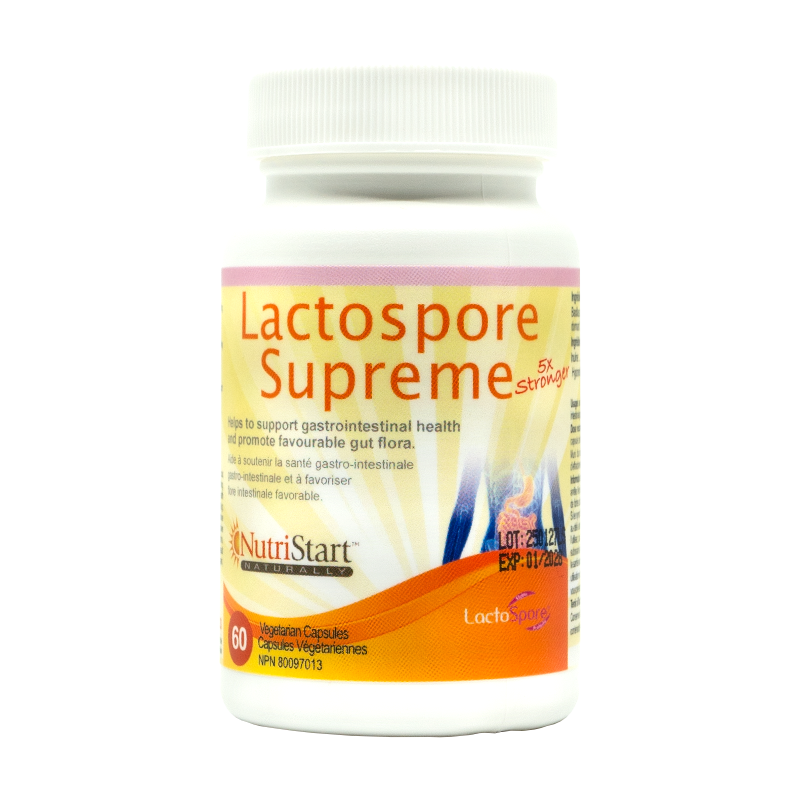
Lactospore Supreme
Regular price
$38.99
Regular price
Probiotic Formula
- Lactospore restores gastrointestinal balance through inhibiting pathogens and encouraging good bacteria to thrive.
- Clinically effective in the management of gastrointestinal problems associated with infections, or the use of antibiotics.
- Proven value in the treatment of diarrheal diseases, and constipation, in populations of all ages.
- Stable at room temperature, naturally resistant to stomach acid.
- Studies show Lactospore to help reduce symptoms of IBS, regulate cholesterol, reverse canker sores, and support immune function.
Fermented Foods
Fermented foods rich in probiotics (friendly bacteria) have a long history of human use, and such foods are still consumed throughout most of the world to this day. Our modern interest in probiotics is attributed to Metchnikoff’s theory of longevity, which associated the extremely good health and longevity of Balkan peasants with the use of fermented milks in their diet (kefir, yogurt). Metchnikoff, a Russian physician, theorized that the growth of toxin-producing putrefactive organisms in the gastrointestinal tract could be controlled by the consumption of beneficial bacteria from fermented foods, which would implant, and, with the help of lactic acid, colonize in the gut (Metchnikoff, E; 1910).
Probiotics
Around the world, about 20 probiotic strains, singly or in combination, are used in dietary supplements and functional foods. The main probiotic strains used are Lactobacilli (e.g., L. acidophilus); Bifidobacteria (e.g., B. bifidum ); spore-forming lactic acid producing bacteria (Bacillus coagulans); and a probiotic derived from yeast culture (Saccharomyces boulardii).
Colonization of the gut with microflora begins in the infant, shortly after birth. The ecology of the human gastrointestinal tract (now referred to as the microbiome) is a complex one, generally involving two kinds of flora: 1. Indigenous beneficial bacteria which have achieved a symbiotic relationship with the host through a long period of evolution. 2. Potentially pathogenic bacteria.
An optimal “balance” in this microbial population is associated with good health in humans, and is necessary for efficient digestion and maximum absorption of nutrients, for the production of certain nutrients, including B vitamins and vitamin K2, and as well, for a healthy immune system. (Shahani, KM et al, 1980; Gorbach, SL, 1990 Mitsuoka, T; 1988)
In modern times our beneficial microflora are most often compromised by antibiotic therapy. Antibiotics while being used to kill bad bacteria have the side effect of also destroying good bacteria, setting up a scenario where the bad bacteria that remain can overwhelm the remaining good bacteria. This imbalance leads to a various problems, ranging from inefficient digestion, diarrhea, constipation, and flatulence, to severe gastro-intestinal disorders, and overgrowth of candida yeast; unless we compensate, by taking probiotic supplements following antibiotic therapy.
The microbiome can also be disrupted by a poor diet high in sugar and low in fiber, and lacking in fermented foods. Due to modern living, the composition of our intestinal microflora is constantly changing, being influenced by factors such as emotional stress, age, travel to foreign countries, and treatment with medications that can also affect bowel function.
Benefits of Lactic Acid Producing Bacteria
Probiotics in the gut have three major digestive functions, and usually, when we are lacking in good bacteria, digestive disorders are the first symptoms. These three functions are: proteolysis (the breaking down of protein from food), lipolysis(the breaking down of fat from food), and the conversion of lactose (milk sugar) into lactic acid. These digestive functions of probiotics are especially helpful in infant, geriatric and convalescent nutrition, and for those who suffer from lactose intolerance. Many scientists now believe that the human microbiome has a role in the expression or inhibition of a number of illnesses, including allergies, auto-immune conditions, diabetes, eczema, IBS, fibromyalgia, hypertension, liver malfunction, multiple sclerosis, muscular dystrophy, obesity, rheumatism, and some cancers. (Round, J. L., et al (2009). “The gut microbiota shapes intestinal immune responses during health and disease”. Nature Reviews: Immunology, 9 (5): 313–323)
Now that it has also been discovered that some of these microbes can modify the production neurotransmitters, probiotic therapy is being tested to treat neuro-chemical imbalances, such as anxiety, bipolar disorder, depression, and schizophrenia. (Bravo, Javier A., et al. “Ingestion of Lactobacillus strain regulates emotional behavior and central GABA receptor expression in a mouse via the vagus nerve.” Proceedings of the National Academy of Sciences 108.38 (2011)
Lactospore Research
Irritable Bowel Syndrome: This randomized, double-blind, placebo-controlled clinical study involved 44 subjects with IBS, who received either placebo or B. coagulans (L. sporogenes), once a day for 8 weeks. “Preliminary data suggest that the patented B. coagulans probiotic may be a safe and effective option for the relief of abdominal pain and bloating for patients with IBS.” (Hun, L., 2009. “Bacillus coagulans significantly improved abdominal pain and bloating in patients with IBS”. Postgraduate Medicine 121 (2): 119–124)
Immune System Support: A controlled study was conducted to evaluate the effects of the probiotic Bacillus coagulans (L. sporogenes) on the immune system when exposed to adenovirus and influenza in healthy adults. “The use of B. coagulans significantly increased T-cell production of TNF-alpha in response to adenovirus exposure and influenza A exposure, but it did not have a significant effect on the response to other strains of influenza.” (Baron, M., 2009. “A patented strain of Bacillus coagulans increased immune response to viral challenge”. Postgraduate Medicine 121 (2): 114–118)
Cholesterol Regulation: Oral L. sporogenes supplementation (360 million spores/day) decreased total serum cholesterol from an average of 330 mg/dL to 226 mg/dL in 17 subjects with type II hyperlipidemia over a three-month time interval. HDL (good) cholesterol increased slightly. (Mohan, J.C. et al. (1990b) Short term hypolipedemic effects of oral L. sporogenes therapy in patients with primary dyslipidemias. Indian Heart J. 42(5): 361-4)
Digestive Disorders: It has been reported that “the efficacy of treatment in patients with bacterial dysbiosis receiving L sporogenes was 20-30 percent higher than traditional probiotics such as Lactobacillus acidophilus or Bifidobacteria.” (Voichishina LG, et al. The use of sporulating bacteria in treating patients with dysbacteriosis. Vrach Delo 1991;12:73-75) “Seventy percent of individuals suffering from chronic constipation treated with 300-750 million spores per day of L. sporogenes for two to 10 days experienced an amelioration of abdominal distention and a normalization of stools. Reports suggest a benefit in neonatal diarrhea.” (Dhongade RK, Anjaneyulu R. Maharashtra Medical J 1977;23:473-474)
“Clinical efficacy of L. sporogenes has been shown in the management of gastrointestinal problems associated with infections or the use of antibiotics. Conditions include diarrheal diseases and constipation, as studied in populations of all ages, including infants and children. (Abstracts, 1968; Chandra, RK et al, 2002; Dhongade, RK et al, 1977; La Rosa, M. et al.; 2003)
Canker Sores: Reports suggest efficacy in the treatment of canker sores with resolution occurring within two to three days. (Sharma JK, et al. Clinical trial of Sporlac in the treatment of recurrent aphthous ulceration. Uttar Pradesh State Dent J 1980;11:7-12)
Animals: In pets and farm animals, administration of Lactospore® can facilitate the establishment of a healthy gastrointestinal microfloral profile, reduce digestive upsets, improve feed utilization, and support healthy growth and a healthy immune system. (Gandhi, AB et al, 1990; Kim, YM, et al.1985; Kumar, ORM et al, 1989; Han, JK et al; 1984).
Health Canada License NPN 80065270
Health Canada License for Children NPN

Lactospore Supreme
Recently Viewed

Lactospore Supreme

Lactospore Supreme

Lactospore Supreme

Lactospore Supreme

Lactospore Supreme

Lactospore Supreme

Lactospore Supreme

Lactospore Supreme

Lactospore Supreme


